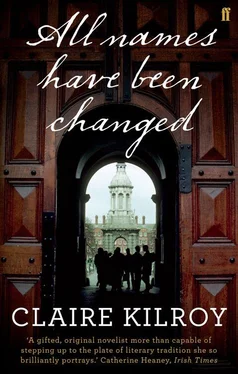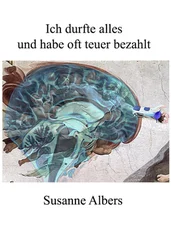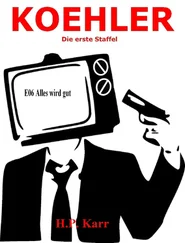Claire Kilroy - All Names Have Been Changed
Здесь есть возможность читать онлайн «Claire Kilroy - All Names Have Been Changed» весь текст электронной книги совершенно бесплатно (целиком полную версию без сокращений). В некоторых случаях можно слушать аудио, скачать через торрент в формате fb2 и присутствует краткое содержание. Год выпуска: 2010, Издательство: Faber & Faber, Жанр: Современная проза, на английском языке. Описание произведения, (предисловие) а так же отзывы посетителей доступны на портале библиотеки ЛибКат.
- Название:All Names Have Been Changed
- Автор:
- Издательство:Faber & Faber
- Жанр:
- Год:2010
- ISBN:нет данных
- Рейтинг книги:5 / 5. Голосов: 1
-
Избранное:Добавить в избранное
- Отзывы:
-
Ваша оценка:
- 100
- 1
- 2
- 3
- 4
- 5
All Names Have Been Changed: краткое содержание, описание и аннотация
Предлагаем к чтению аннотацию, описание, краткое содержание или предисловие (зависит от того, что написал сам автор книги «All Names Have Been Changed»). Если вы не нашли необходимую информацию о книге — напишите в комментариях, мы постараемся отыскать её.
All Names Have Been Changed — читать онлайн бесплатно полную книгу (весь текст) целиком
Ниже представлен текст книги, разбитый по страницам. Система сохранения места последней прочитанной страницы, позволяет с удобством читать онлайн бесплатно книгу «All Names Have Been Changed», без необходимости каждый раз заново искать на чём Вы остановились. Поставьте закладку, и сможете в любой момент перейти на страницу, на которой закончили чтение.
Интервал:
Закладка:
The shadow of the leg of Glynn’s desk was rapidly fading from the floor. It could have been my own reflection I was watching disappear, the impact this dwindling had on me. A black cloud was occluding the watery sun. Glynn’s office darkened with remarkable speed, as if a whale were swallowing us whole. I looked at the Professor with appeal and saw the same appeal in him.
‘Dropping out?’ he prompted me. ‘Why?’
I shrugged. ‘Because I feel so …’
The only adjective that sprang to mind was ‘wobbly’. How could I produce the likes of ‘wobbly’ in front of the likes of Glynn? Words were at least as clunky as Glynn’s collection of trophies, his bulky lumps of metal and stone which in no way communicated the literary achievements they’d been designed to represent. I didn’t finish my sentence, merely shrugged again. Really, the intensity of the moods that used to sweep over me then.
The stoical nod with which Glynn received this information, or lack of it, indicated that nothing I could say would surprise the man. He had seen it all before. Emotions that were new and raw to me had been endured by him years ago, in another life that was over now, and all he could do was nod with a recognition that was in itself a comfort. He stood up and went to his bookcase, his repository of infinite riches, his windbreak, and selected a thick red leather tome. The Collected Works of William Blake, his favourite British poet. The Devil’s Party, Glynn’s sixth novel, was loosely based on Blake’s life. Parallels between the two men were not difficult to discern.
I watched as Glynn took down two more volumes of Romantic poetry and retrieved a metal hip flask from its hiding place at the back of the bookcase. He produced two teacups from his drawer and poured a generous measure of whiskey into each. He handed one cup to me and raised the other. ‘So explosive, MI5 monitors the distillery,’ he joked, but neither of us laughed. We sat in silence in Glynn’s trophy room while the world outside darkened around us, and the whiskey warmed the world within us. Lights in the offices across the way came on one by one. Glynn poured himself another drop.
‘You remind me of myself,’ he finally commented. The compassion with which he offered this was almost paternal in quality. ‘I won’t lie to you,’ he added, ‘it’s a difficult path we’ve chosen.’ We. It didn’t matter that everything recently written about Glynn read like a death notice. He kept writing writers’ novels, that was the problem. Readers’ novels were what was wanted. His career had been deemed moribund by those in the know, but still, I’d have done anything to join him.
‘You wouldn’t be feeling any better now?’ he wondered when my cup was empty.
‘I would,’ I told him. It was the truth.
‘Good man, good man.’
He returned the two teacups to the drawer and slotted the hip flask back in behind Blake, Byron and Shelley. I stood up, and he saw me to the door. Tacked to his message board was another pale-blue note. Glynn smiled weakly as he unpinned it. I lowered my eyes in embarrassment.
He gripped my shoulder. ‘Look after yourself, Declan.’ I didn’t know what to say. He retreated to his den with the note. An image of a lily stem, of all things, flashed into my mind, a freshly cut lily stem with three closed buds that I had once contemplated in a glass vase. The buds would open because they didn’t understand that their life supply had been severed, that they were already dead. I gazed at Glynn’s stooped shoulders as his door swung shut and thought of that stem, think of it still, think of him still, think of us all still, flowering regardless.
PART II Hilary Term, January
13 I don’t like Mondays
The morning of the sixth of January found me sitting bolt upright at my desk in the flat on Mountjoy Square. I hadn’t spoken in five days. A month had passed since the last workshop. My pens and paper were laid out in front of me, but I wasn’t writing: I was listening. Several odd things had occurred in rapid succession. First, the animal cries. A dog started yelping at its upper register, its agony piercing the thin blue sky. It was coming from the back lane. Somewhere below, not far from where I sat, a bloody scene was unfolding. That I could not see it only made it worse. I would have given anything to make it stop.
And then, abruptly, the yelping did stop. The silence which ensued was more ominous still. I sat rooted to the seat.
Next came the rhythmic thumping in the sky, as if the wings of a huge bird were beating the air. It came from all directions at once, growing louder and closer. It took a long time for the helicopter to appear. That’s when I clapped eyes on the gull. I hadn’t seen it alight. A massive creature, big as a fox, but brazen, territorial, almost pugilistic in its assertion of its dominion, mounted on the spine of a roof. It had its eye on me, its glassy, lemony eye. It did not have to turn its head to regard me.
A shaft of low light illuminated the gull as purple storm clouds bore down on the winter sun. You could wait all year for such light and still not find it. I tried to take it in as best I was able. The gull was smooth, sculptural, declaratory, and showed no fear at all, just a — what could you call it? — a knowingness, as if it wasn’t a bird in that round earless skull, exactly. No, not the consciousness of a bird in there, exactly.
The first plump raindrops slashed across the windowpane. A flash of sheet lightning, followed by a rumble of thunder. Something was expanding within me. I put down my pen. The gull was ululating by then, a wild, maniacal sound. A torrential downpour drowned him out. Then the doorbell rang. The doorbell, in that weather. I could hardly believe it.
Two men in navy suits and beige trench coats were standing on the doorstep under a green golf umbrella. The sky lit up theatrically behind them. ‘Is Jesus in your life?’ one of them asked me in a dapper London accent. Their trousers gleamed wetly like bin liners. ‘You’re having me on,’ was the best I could manage.
I pushed past them down the steps, and the front door clattered shut behind me. ‘Ah Jesus,’ I cried — my keys were upstairs on my desk. The second man said something that I didn’t catch and pressed a magazine into my hands.
The rain was lashing so hard by then that it bounced back up from the pavement. Cars ploughed hesitantly through the rising floodwater, waves rippling in their wake. The orange hulk of a double-decker bus was making slow progress along the North Circular Road. I ventured in the slipstream towards it. It was as dark as dusk, though the church bells hadn’t yet rung the noon Angelus.
I could find no bus stop on that stretch of the North Circular, so I waved my Jesus magazine. The bus pulled in, and the doors retracted. ‘Get in, get in!’ the driver roared, like a man hauling bodies out of the sea. ‘Where’s your coat? Merciful hour.’
My shoes squelched as I climbed to the top deck. The rain was drumming hard on the roof. The bus braked, and I went stumbling forwards. There was an empty seat up near the front. I slotted myself in beside a man reading the Star. The windows had steamed up with condensation. The outside world was a mess of headlamps and tail lights looming through the dribbling greyness. ‘Thin Lizzy’ was scratched into the seat in front of me. ‘Philo RIP.’ The conductor came up and collected my fare. No one got on or off. We trooped along in a convoy of traffic as if we had all day.
I kept my eyes on the ‘RIP’, listening to the tinny dumb dumb dumb of someone else’s headphones. Water rolled up and down the aisle of the bus, which surged forward and drew back again like an uncertain child. The idling engine hit a frequency that caused the windows to vibrate.
Читать дальшеИнтервал:
Закладка:
Похожие книги на «All Names Have Been Changed»
Представляем Вашему вниманию похожие книги на «All Names Have Been Changed» списком для выбора. Мы отобрали схожую по названию и смыслу литературу в надежде предоставить читателям больше вариантов отыскать новые, интересные, ещё непрочитанные произведения.
Обсуждение, отзывы о книге «All Names Have Been Changed» и просто собственные мнения читателей. Оставьте ваши комментарии, напишите, что Вы думаете о произведении, его смысле или главных героях. Укажите что конкретно понравилось, а что нет, и почему Вы так считаете.












